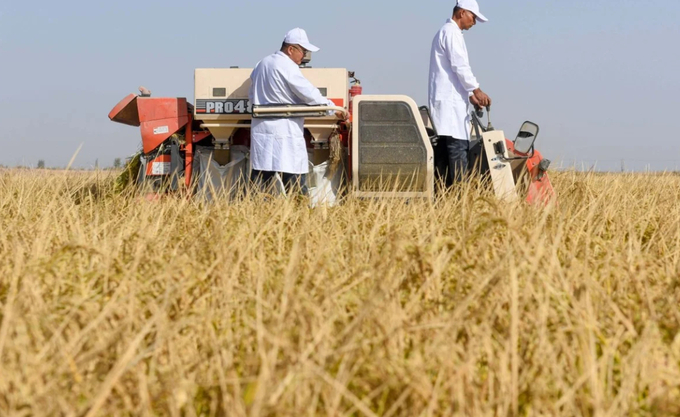November 27, 2025 | 16:31 GMT +7
November 27, 2025 | 16:31 GMT +7
Hotline: 0913.378.918
November 27, 2025 | 16:31 GMT +7
Hotline: 0913.378.918

China has the world’s third-largest surface area of saline-alkaline land at about 100 million (247 million acres) hectares. Photo: Xinhua
As extreme weather events battered China’s traditional breadbaskets and abrupt geopolitical shifts made reliable grain prices a thing of the past, Beijing has ramped up its campaign to safeguard food security, employing a variety of methods to expand yields and cultivate more efficiently.
To guarantee its 1.4 billion people can be fed without despoiling its limited stocks of arable land – a paradox that has always been a major hurdle to self-sufficiency -the country has explored ways to grow in soils dense with plant-killing salts and minerals.
These efforts have, so far, met with success. The country’s Ministry of Agriculture and Rural Affairs announced this month that China’s 2023 grain output was the largest in history.
“Saline-alkaline land” refers to soil that contains an excess of both soluble salts and exchangeable sodium, both of which make land more difficult to farm.
China has the world’s third-largest surface area of saline-alkaline land at about 100 million (247 million acres) hectares, with about one-third carrying the potential for utilisation.
That land is distributed throughout the country, found in 19 provinces spanning China’s southeastern coast as well as the arid north and northwest.
The cultivation of saline and alkaline soils is one of many areas Beijing has identified to bolster its domestic food supply.
Others include the strict protection of arable land, building “high-standard” land, amending and drafting laws on food security and improving per-unit yield through mechanisation and new technologies.
Saline-alkaline soil has been named as a “non-traditional farmland” worth targeting for reclamation.
Turning seemingly toxic stretches of land into workable tilling ground would be a major accomplishment, as it would demonstrate China can overcome limitations on its natural resources and “steadily expand the space for agricultural production”.
President Xi Jinping, who has on many occasions called for the country’s “rice bowl” to be “firmly held” by the Chinese people, acknowledged “farm protection [had become] more difficult” in a high-level meeting in July.
By then he had already broached the subject of saline-alkaline soil twice, once during a visit to the northern province of Hebei in May and again on a June tour of an agricultural park in the Inner Mongolia autonomous region.
China has employed several approaches to making saline-alkaline land more fertile. It has ameliorated mineral content, developed more tolerant crops – or both, depending on the area – to strengthen self-reliance and reduce dependence on imports.
In June, China Science Daily reported new salt-tolerant species had been planted in Dongtai of east China’s Jiangsu province, making “record” progress in growing rapeseed in salty soil.
An aquaculture firm in the Xinjiang Uygur autonomous region reported in August it had used the area’s saline mix to simulate seawater, opening the country’s inland to seafood farming.
Saline-alkaline land in northeast China’s Jilin province has also seen impressive harvests after soil treatment and the improvement of tolerant crops, People’s Daily reported last month.
Different types of saline or alkaline farmland should be managed with tailored approaches, Xi said during the meeting in July.
Those which have been effective, he added, should be widely applied, with the government formulating fiscal and monetary policies to support projects that have proven successful.
A guideline on the comprehensive utilisation of saline-alkaline land has also been reviewed and approved, the official Xinhua News Agency has reported.
In the meantime, efforts are likely to continue to breed more tolerant varieties of crops and testing newer methods that could increase yields or widen the scope of usable soils.
(SCMP)

(VAN) A new study reveals how the simultaneous effects of ocean acidification, salinity and loss of oxygen are making the world more fragile.

(VAN) Hopes are growing that the creation of the first 3D turkey gut model could be a turning point in the battle against the virulent blackhead disease.

(VAN) Tyson, America’s biggest meat supplier, plans to shutter one of its largest beef processing plants as the industry continues to struggle with low cattle supplies and political pressure from Washington.

(VAN) New FAO study shows how digital solutions are empowering farmers and fishers to prevent losses and build resilient agrifood systems.

(VAN) Brazil's COP30 presidency pushed through a compromise climate deal on Saturday that would boost finance for poor nations coping with global warming but that omitted any mention of the fossil fuels driving it.

(VAN) Poultry farmers in the UK have been warned that they could face one of the worst winters yet for bird flu.

(VAN) Prices of main-crop paddy have risen sharply, with jasmine rice hitting 16,100 baht per tonne — the highest level in years.